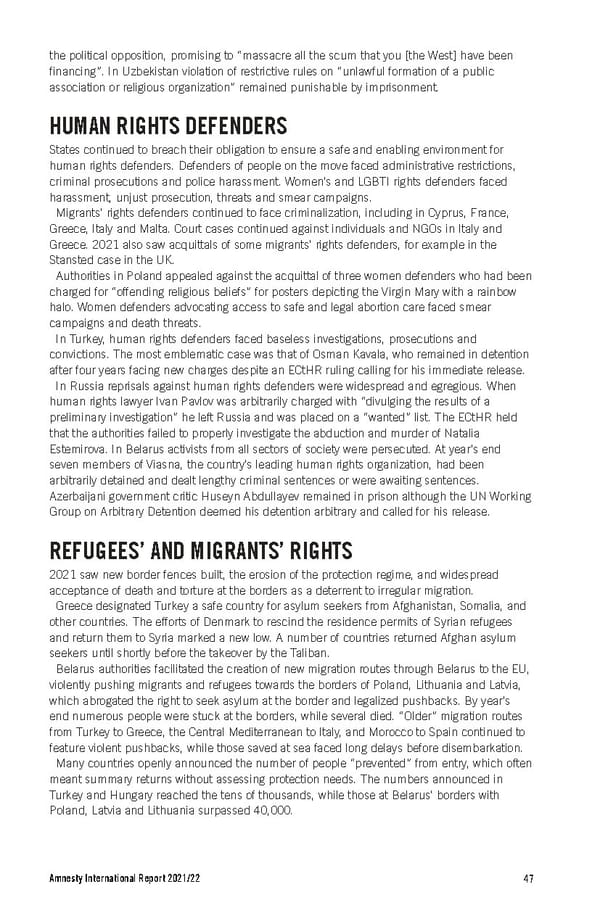the political opposition, promising to “massacre all the scum that you [the West] have been financing”. In Uzbekistan violation of restrictive rules on “unlawful formation of a public association or religious organization” remained punishable by imprisonment. HUMAN RIGHTS DEFENDERS States continued to breach their obligation to ensure a safe and enabling environment for human rights defenders. Defenders of people on the move faced administrative restrictions, criminal prosecutions and police harassment. Women’s and LGBTI rights defenders faced harassment, unjust prosecution, threats and smear campaigns. Migrants’ rights defenders continued to face criminalization, including in Cyprus, France, Greece, Italy and Malta. Court cases continued against individuals and NGOs in Italy and Greece. 2021 also saw acquittals of some migrants’ rights defenders, for example in the Stansted case in the UK. Authorities in Poland appealed against the acquittal of three women defenders who had been charged for “offending religious beliefs” for posters depicting the Virgin Mary with a rainbow halo. Women defenders advocating access to safe and legal abortion care faced smear campaigns and death threats. In Turkey, human rights defenders faced baseless investigations, prosecutions and convictions. The most emblematic case was that of Osman Kavala, who remained in detention after four years facing new charges despite an ECtHR ruling calling for his immediate release. In Russia reprisals against human rights defenders were widespread and egregious. When human rights lawyer Ivan Pavlov was arbitrarily charged with “divulging the results of a preliminary investigation” he left Russia and was placed on a “wanted” list. The ECtHR held that the authorities failed to properly investigate the abduction and murder of Natalia Estemirova. In Belarus activists from all sectors of society were persecuted. At year’s end seven members of Viasna, the country’s leading human rights organization, had been arbitrarily detained and dealt lengthy criminal sentences or were awaiting sentences. Azerbaijani government critic Huseyn Abdullayev remained in prison although the UN Working Group on Arbitrary Detention deemed his detention arbitrary and called for his release. REFUGEES’ AND MIGRANTS’ RIGHTS 2021 saw new border fences built, the erosion of the protection regime, and widespread acceptance of death and torture at the borders as a deterrent to irregular migration. Greece designated Turkey a safe country for asylum seekers from Afghanistan, Somalia, and other countries. The efforts of Denmark to rescind the residence permits of Syrian refugees and return them to Syria marked a new low. A number of countries returned Afghan asylum seekers until shortly before the takeover by the Taliban. Belarus authorities facilitated the creation of new migration routes through Belarus to the EU, violently pushing migrants and refugees towards the borders of Poland, Lithuania and Latvia, which abrogated the right to seek asylum at the border and legalized pushbacks. By year’s end numerous people were stuck at the borders, while several died. “Older” migration routes from Turkey to Greece, the Central Mediterranean to Italy, and Morocco to Spain continued to feature violent pushbacks, while those saved at sea faced long delays before disembarkation. Many countries openly announced the number of people “prevented” from entry, which often meant summary returns without assessing protection needs. The numbers announced in Turkey and Hungary reached the tens of thousands, while those at Belarus’ borders with Poland, Latvia and Lithuania surpassed 40,000. Amnesty International Report 2021/22 47
 Amnesty International Report 2021/22 Page 46 Page 48
Amnesty International Report 2021/22 Page 46 Page 48